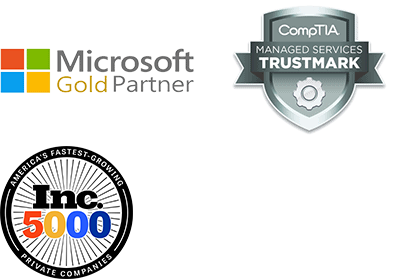When you feel like your IT is falling behind and you are struggling to even “keep the lights on,” sometimes it is tough to know where to turn. This leads many organizations to consider outsourcing their IT to a Managed Service Provider (MSP). Undoubtedly there are many approaches to outsourced IT support from to choose from, and it is difficult to know what you should be looking for when choosing a provider.
While it’s easy to become overwhelmed with so many things to consider, there are 5 critical factors to consider when evaluating a new IT provider. These are not always apparent in the sales process but it’s critical to ask questions related to these factors and validate the answers from current clients.
1. Process-Driven
Have you ever returned to a restaurant and the whole dining experience from the attentiveness of the wait staff to the meal you enjoyed, the presentation and taste was totally different than past experiences? A restaurant should have a process around their wait staff and their kitchen where the customer can have a predictable service experience and quality dish every time around.
An operationally mature MSP should also have a process around providing managed services to deliver a consistent service experience. Processes are set, defined and refined on a continual basis where people manage and follow those processes. If the provider does not have a documented, thorough onboarding process as well, chances are that your support experience will be inconsistent.
2. Accountability
Things go wrong, mistakes can happen, and nobody is perfect, but how the provider owns up to that is a sign of true integrity. Does your provider truly do what they say they will or was it just marketing-speak to get you in the door? A goal of creating a culture of accountability within the team maintains an atmosphere of constant innovation and improvement. A World class MSP will always seek to improve. They have key metrics that are measured and improved upon that helps ensure you can expect the same quality results every time you call.
3. Revolve Around You
Working with a managed service provider should not be about relinquishing control of your IT operations, rather it’s about delegating to their expertise of IT operations, technology and hardware that an operationally mature MSP possesses.
A highly functioning MSP will revolve their service around your business goals and provide strategic plans that cater to your business’s technology needs. A provider that will sit down with you to assist in your technology budgeting and planning for the future. The focus should be on your performance and growth, not the other way around.
4. Size Matters
For a lot of reasons size of the provider should be evaluated when you look to make a change. Smaller customers might feel that their account will get lost in the shuffle of a larger provider while other customers worry that a small provider may not have enough diversity of staff to support all the different kinds of technology in their organization. Worse yet, a 3 or 5-person shop could have a flu outbreak where literally the entire office could be out for a week leaving you high and dry without any support! Ideally you should be supported in a way that gives you the feel or attention level that you would expect from a smaller organization but where there is enough staff and organizational size to deliver the benefits you get from working with a large organization
Size does matter, and the size of a MSP usually dictates how established their processes are, the level of accountability and metrics used, their ability to deliver on their promises, their technical breadth, staff redundancy, greater ability to leverage vendors and the level of strategic consulting they can provide to help your business move forward.
Larger service providers who are experienced strive for continuous service improvement. They are mapping out new products, providing feature enhancements to existing products, and offering version upgrades to their applications or tools. When evaluating your next provider ask questions like “What new products do you plan on releasing in the next year”, or “are you planning to upgrade any of your vendor tools in the next year and what new features will be included with those releases?” If they cannot answer those questions it likely means they are not thinking far enough ahead and if that’s happening within their own business, how will they think ahead for your business when you engage?
5. Can They Truly be Strategic for Your Business?
When evaluating a service provider make sure to ask who will be providing thought leadership relative to technology for your organization. Who is going to align your technology roadmap with your corporate budget for IT? Who is going to review the various reports that should be available from the provider about the service being delivered to your firm to make sure you are getting the true value out of your IT investment?
If the provider cannot answer those questions and doesn’t have specific people in place to consult with you about your business’s needs, you may not receive those services or be disappointed in the outcome once you’ve signed up. Without an ongoing approach and process built to help customers with their IT strategy, the provider is going to have a difficult time delivering on its service commitment to your firm, which will result in reduced value to you.
Whether it is improving efficiency by saving time, saving money by identifying problems before they occur, or avoiding costly disasters and repairs, a managed services provider can bring great value to your business and improve your bottom line. Finding a true partner to look out for your technology needs will help your business grow to the next level.
Related Topics





